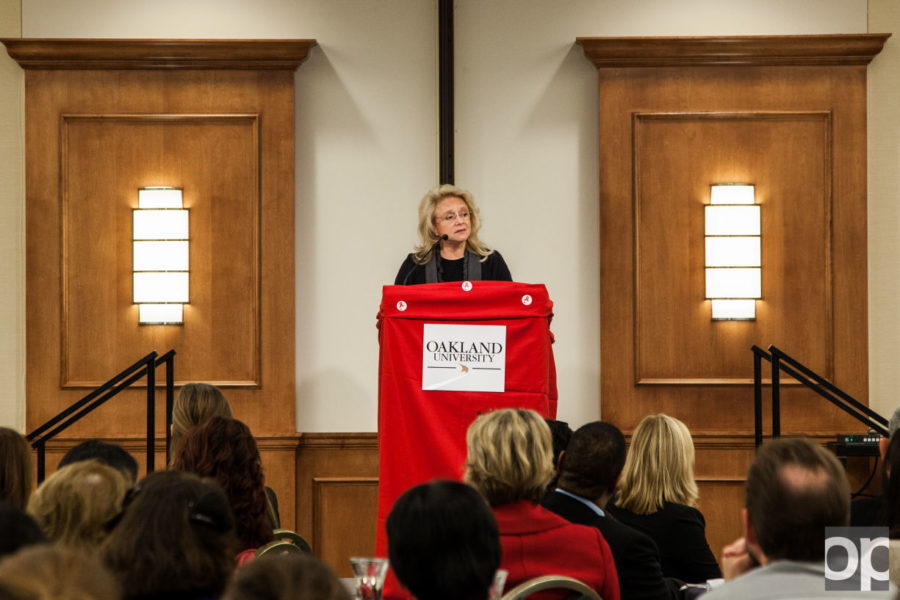Renowned speaker shares her experience fighting AIDS
Mary Fisher, a globally renowned speaker and AIDS activist, shared her advice and experience with medical school students Monday, Dec. 1.
Fisher was a guest speaker for a series of lectures being held in honor of Michele D. Raible, Associate Dean for the Oakland University William Beaumont (OUWB) School of Medicine.
While those in attendance munched on a free buffet-style lunch, OUWB Founding Dean Dr. Robert Folberg opened the program with some history on the OUWB and those who had helped to create it.
One question Folberg said he, Raible and the others were challenged to answer when creating the school was one of educating more than the mind. They could train students to be brilliant, but how could they teach doctors to be kind?
“We came up with a mission statement,” Folberg said, “that ends with a saying that this medical school should take a leadership role in promoting, maintaining and restoring health in individuals and the community.”
This mission was something Raible worked tirelessly for right up until she lost her battle to leukemia, Folberg said.
Fisher was the first speaker to come to share Raible’s and the OUWB’s vision and ideas through her own experiences.
Fisher’s history
Fisher first came into the world’s line of vision when she spoke at the 1992 Republic Convention, where she brought their attention to AIDS and the fact that it isn’t just a stereotype or shameful disease.
She had contracted HIV from her second husband and was diagnosed in 1991. Her husband told her right before he left her with two children, and that’s when the changes began.
Six books, countless speeches and many global tours later, 66-year-old Fisher has made a name for herself as an activist, author and artist.
Facing the stigma
Monday, Dec. 3 was World AIDS Day, and Fisher opened her speech with a few facts on AIDS.
The numbers are discouraging, she said: nearly 2 million Americans have been infected, two-thirds are dead from it, and over 1 million are living with. Somewhere between 18 to 22 percent of those infected are undiagnosed — the lethal ones, as she called them.
One of the worst things Fisher, who also has breast cancer, has discovered about AIDS is the stigma attached to it.
“If you have cancer, you call a surgeon,” Fisher said. “If you have AIDS, you look for a place to hide.”
People are more willing to discuss and support those with other diseases, but when it comes to AIDS not as many like to acknowledge it, Fisher said. She listed the crisis over a few cases of Ebola as an example.
“If American media were a hospital, it would have only one unit: the emergency room,” Fisher said. “We are addicted to emergencies, to drama, to crisis. We’re bored by problems like AIDS or systematic violence or the incarceration of young black men.”
Her advice for those diagnosed with AIDS: ask for help, take it when you can get it, use protection, stay on your medications, and “don’t do stupid things.”
To hope is to heal
After her husband Brian infected her and left, Fisher said she felt nothing but rage and hatred. When Brian later was on his deathbed and asked for her forgiveness, however, she set aside that anger.
“To come with healing was to come with love,” Fisher said.
The experience changed her and inspired her; she saw the hope she had given him at the end of his life, and felt that hope in herself.
“We have to live with hope. And the best way of doing that is to help others.”
This applies to doctors, she told the audience of medical students. Doctors, healers and scientists, who masquerade as strong even in their weakest moments, need to learn to talk about their first deaths, wrong prescriptions and mistakes.
“The dilemma many of you will face is that you will want to be superhuman,” Fisher said. “You will want to rescue and redeem and then go on to your next triumph.”
There is a limit to what science can do, Fisher said, but that shouldn’t stop anyone.
“You, you are a crowd of potential human healers, a reason for great hope,” Fisher said. “May you go eagerly from the classrooms of science to the bedsides of those who will reach for that healing.”






